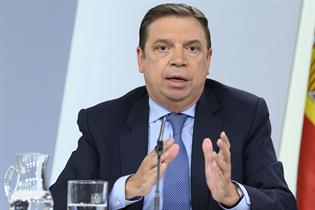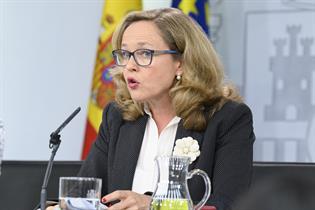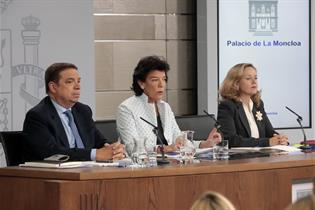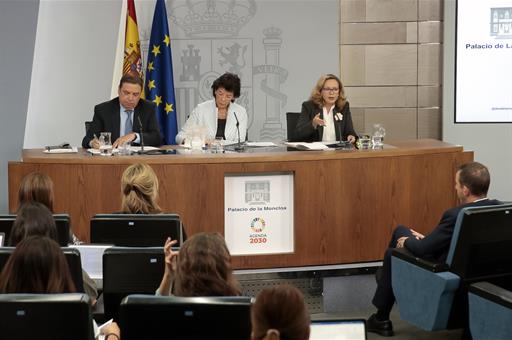Council of Ministers
Government advocates negotiating defence of exports from Spanish agri-food sector to United States
Council of Ministers - 2019.10.4
Moncloa Palace, Madrid
The Acting Minister for Agriculture, Fisheries and Food, Luis Planas, explained the measures that the government has decided to adopt after the publication by the United States Administration on Thursday of the provisional list of European Union products that will be subject to new customs tariffs as of 18 October. This decision particularly affects Spanish food products such as olive oil, olives and wine.
 Pool Moncloa/Borja Puig de la BellacasaLuis Planas described it as "unacceptable that the Spanish agri-food sector should "suffer trade reprisals" deriving from a conflict outside its own sector. The United States is responding, by applying these customs tariffs, to a trade dispute over European public aid to Airbus - Spain is a member of its aeronautical consortium - that the World Trade Organization (WTO) has ruled are unlawful.
Pool Moncloa/Borja Puig de la BellacasaLuis Planas described it as "unacceptable that the Spanish agri-food sector should "suffer trade reprisals" deriving from a conflict outside its own sector. The United States is responding, by applying these customs tariffs, to a trade dispute over European public aid to Airbus - Spain is a member of its aeronautical consortium - that the World Trade Organization (WTO) has ruled are unlawful.
The acting minister claimed that "the Government of Spain is not seeking a trade war between the European Union and the United States" and expressed its interest in entering into negotiations, "which have a time and a material margin". However, he stated that its position will be one of "firm respect for the defence of Spain's interests, those of our agri-food sector and those of the European Union".
The government's first action will be to urge the European Commission to prevent the provisional list from coming into force, to which end there is time until 14 October, when "the conflict resolution body of the WTO" meets in Geneva, explained Luis Planas. In parallel, Spain is already working with the other Airbus consortium partners - France, Germany and the United Kingdom - to forge a common position. The acting minister has convened a meeting with the regional governments on Monday and with the sectors affected as of Tuesday.
Positive economic figures in an international context of uncertainty
 Pool MoncloaThe Acting Minister for Economy and Business, Nadia Calviño, referred to the customs war with the United States as one of the "points of uncertainty" that may affect the Spanish economy, together with the slowdown in international trade and the downturn in the economy in Europe and other parts of the world.
Pool MoncloaThe Acting Minister for Economy and Business, Nadia Calviño, referred to the customs war with the United States as one of the "points of uncertainty" that may affect the Spanish economy, together with the slowdown in international trade and the downturn in the economy in Europe and other parts of the world.
The acting minister announced that over the coming weeks, she will take part in meetings of the Economic and Financial Affairs Council (Ecofin), the G-20, the International Monetary Fund and the World Bank "to see how the main international figures are developing".
Nadia Calviño claimed that we must not become alarmist - "that's not productive" - nor must we be complacent since the current figures regarding the Spanish economy are positive - expansive phase, clear growth differential with regard to the Eurozone, rising GDP and a rate of job growth that is higher than economic growth.
"We have firm foundations to tackle any episode of instability on the international stage", she said, "but we are in an open economy and Spain cannot isolate itself if these episodes get worse or go on in time".
Nadia Calviño argued that "what is important is to responsibly, prudently and rigorously manage the public sector, and place the interests and concerns of citizens at the heart of any actions".
Appeal to Constitutional Court to annul a resolution of Regional Parliament of Catalonia
 Pool Moncloa/JM CuadradoThe Council of Ministers has approved appealing two enforcement procedures of rulings before the Constitutional Court on some of the sections of a resolution adopted by the plenary session of the Regional Parliament of Catalonia on 25 July regarding self-determination and Republican values. The government is requesting that they be annulled and suspended.
Pool Moncloa/JM CuadradoThe Council of Ministers has approved appealing two enforcement procedures of rulings before the Constitutional Court on some of the sections of a resolution adopted by the plenary session of the Regional Parliament of Catalonia on 25 July regarding self-determination and Republican values. The government is requesting that they be annulled and suspended.
The Acting Minister for Education and Vocational Training, and Government Spokesperson, Isabel Celaá, remarked that the content of the resolution adopted by the Regional Parliament of Catalonia violates two rulings of the Constitutional Court, by once again proclaiming the right to self-determination as a way of gaining sovereignty for the people of Catalonia.
Luis Planas, in his capacity in charge of the ordinary affairs of the Ministry of Territorial Policy and Public Function, explained that the mechanism of the enforcement procedures is provided for in the Law on the Constitutional Court and allows the government to avoid "bringing a new appeal" on matters with previously established legal doctrine.
Subsidies for development of 5G technology
The Council of Ministers authorised the second call for proposals for subsidies for pilot projects to develop 5G technology. With a provision of 45 million euros co-financed by EU funds under the ERDF programme, the initiative is aimed at backing a maximum of 11 experimental projects in 11 autonomous regions.
Nadia Calviño highlighted the importance of this technology, "which will fundamentally change the economic and social reality of the future", and the need for Spain to be "at the forefront" of that change.
Other agreements
- Royal Decree transposing the European Council Directive on the coordination and cooperation measures to facilitate consular protection for unrepresented citizens of the Union in third countries.
- Procurement of 2,160 patrol cars for the National Police, for a sum of 58.6 million euros
- Official statement on the occasion of World Day and European Day against the Death Penalty, on 10 October.
- Report on the commemorative actions of the 25th anniversary of the Beijing Declaration and Platform for Action (Beijing +25). The Chinese capital held the Fourth World Conference on Women that led to the signing of this document on women's rights.
Current affairs
The Acting Government Spokesperson, Isabel Celaá, argued that the government, in addition to the customs war with the United States and the international economic situation, is paying close attention to other upcoming challenges such as Brexit and the ruling in the pro-independence cases.
Isabel Celaá underlined that the government, while in a caretaker capacity, "is not dysfunctional", since it has the mechanisms constitutionally and legally attributed to it in order to continue meeting its main obligation, which is to "oversee the interests of all Spanish citizens".
Non official translation





